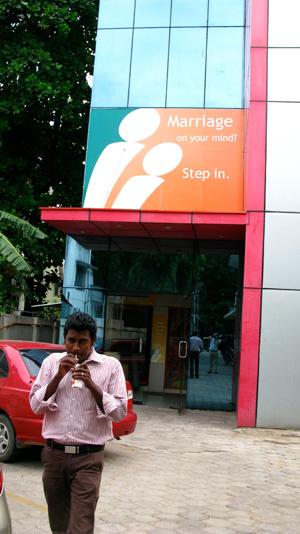Beyond Class Part IV: India – Searching for Your Caste Online
Inter-caste marriage is still the exception rather than the rule in India.
Off a busy street in downtown Chennai, there’s a small store belonging to TamilMatrimony.com, an Indian company that promises to help you find your spouse online.
The store is meant to draw in Indians who don’t use or can’t afford computers. Clients sign up in person and take home print-outs of the profiles that they’re interested in. Find a good match, and they can set up a meeting.
The founder of Tamil Matrimony, Murugavel Janakiraman, said it’s easy: “They discuss. Then they like. Then they get married.”
Janakiraman operates a range of localized marriage sites across India, including GujuratiMatrimony and PunjabiMatrimony. In all, the businessman claims about 20 million Indians are currently using his services.
“The future of the country depends on its citizens,” he told me. “Good citizens come out of good parenting. Good parenting comes out of good marriage.”
And so, he argued, his ‘Matrimony’ sites are creating a healthy future for the whole country.
The model is familiar to anyone who’s been online dating in the US: you make a series of selections to narrow down your search. The Indian matrimony sites offer countless drop-down menus covering things like eating habits, religion, income, and caste.
At the TamilMatrimony store in Chennai, I talked with a young woman named Darshani as she looked over profiles of men, accompanied by her mother. They were searching for the right ‘alliance’, as they say in India.
“Based on my mother’s gut feel,” Darshani said, “an alliance will be set within three months.”
Darshani is a 24-year-old computer engineer; she’s also got an MBA. In other words, she’s the epitome of India’s young, and growing, professional class. In the store, a ‘relationship manager’ named Abishek Kapoor was on hand to help out.
“Definitely she’s looking for somebody who’s equivalent or higher than what she is,” he said. “A person who’s well-settled, a person who’s earning well so she can feel secure.”
Darshani and her mother also specified that her future husband should be a meat-eater; that he should share her religion; and that he should be of the same caste.
“They belong to a particular community, so they feel that going to another community will not match their values and culture”, said Kapoor.
Darshani herself told me that she would prefer an inter-caste marriage, but that her family would not allow it. That’s typical, said relationship manager, Kapoor: families want the same caste.
“They don’t want differences, because in India it’s a very diverse [country]. So each and every community has their way of doing things.”
‘Their way of doing things’: That’s the argument for same-caste marriage that the company CEO, Murugavel Janakiraman, was making too. It’s about removing friction in a relationship, simply reducing the chances of two people having uncomfortable differences of opinion. Caste as an indicator of commonality in terms of things such as food, tradition or culture.
I challenged Janakiraman on that point, suggesting that for some caste might also mean deprivation or a bar to professional advancement.
He replied, “No, I think that [there’s] nothing wrong as long as people are understanding that caste is only about the culture.. way of doing things.”
Caste, said Janakiraman, is not about social status any more. But that take on the system is a privilege of the few. In fact, the higher up India’s social ladder you go, the easier it is to pick and choose which aspects of caste matter to you. In fact, at the very top of the ladder you find a group that’s now able to leave caste behind altogether: the new super-rich, India’s millionaires. People, in fact, like Janakiraman himself.
“For those people it really doesn’t matter,” he said, “because for them they’re not really defined or bothered with their social circle, because for the rich and affluent, it’s a social circle …a caste by itself.”
India’s rich and affluent as a caste–and a class–by itself. For those people, it doesn’t matter how high or low a caste they were born into: money trumps everything.
But for others, and for the modern India that sites like Tamil Matrimony.com are claiming to build, caste remains a fundamental force.
Anand Giridharadas is a columnist for the New York Times and the author of India Calling: An Intimate Portrait of a Nation’s Remaking. He was born in Cleveland to Indian immigrant parents. His parents came from different castes, and raised him to ignore the proscriptions of the caste system. Here, he talks with The World’s Marco Werman about how caste came into being and how India is gradually shaking free of it.
